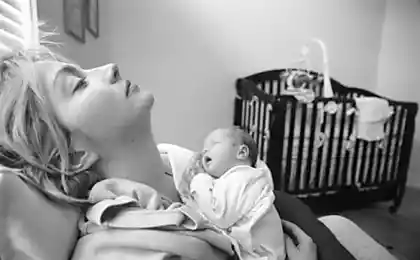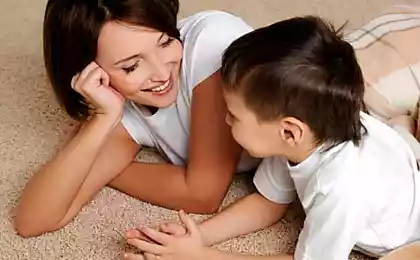666
Mother not girlfriend
This could be pamphlets on the subject of usefulness and beautiful friendship in the relations of children and parents. But they will not. Bombastic arguments enough for the pages of magazines for parents in the Internet space. And many of them only confuse adults.
WHAT IS FRIENDSHIP
Friendship — relations between people based on mutual affection, spiritual closeness, common interests, sympathy and trust. One of the signs of friendly relations — equality of the partners. They choose each other by mutual sympathy, similar interests, respect each other as equals.

Between children and parents line up other relations are hierarchical. Parents above, they are leaders. The children below, they are subordinate. Hear the murmur of some readers: "It is not. Parents and children should be friends! You cannot put their interests above the interests of the child!" But the relations of parents and children is really important hierarchy. Parents have the right to insist, to guide the actions of children. Children should listen to parents and follow their instructions, even if sometimes they do not like. Not everything can be the object of discussion. Parent is the carrier of knowledge, rules, traditions, and "punishing authority" in the case of serious misconduct. So can't be a friend who is originally equal. Each can only Express their opinion, but to prohibit or insist.
And the most important thing in parent-child relations (and with almost no friendly), it's addiction. Children are dependent on parents physically (the child itself cannot fully protect their health), material (eat, drink, dress, live in a house, to have the necessary things), social (kindergarten, school, circles and sections), as well as psychologically. While there is a dependence on friendship is uncertain.
HUMANISTIC CONFUSION
Someone once said: "Children and parents should be friends", and this phrase for a long time, almost did not cause disputes. After all, what a wonderful promise! How can you go against the friendship, especially between parent and child?
Actively starting to sound about twenty years ago, this promise played an important role in the restructuring of the approach to the education of children, surpassing the rigid authoritarian style in favor of democratic. Parents learned that children from childhood is a person that you don't have to shout and beat with a twig, and can be persuaded to talk and motivate. And most importantly, they realized that their credibility will be higher if the child is to show respect. It is the phrase "Children and parents should be friends" was the short but succinct slogan of a new, more humanistic position. And in this capacity its role is difficult to overestimate.
In fact, the question of friendship is not. What is called "friendship" between parents and children is the authoritative parenting style. When this style of control over the behavior of the child is sufficient respect for freedom — at a high level. The parents explain to the child the rules of conduct, insist on the key points, use different ways to convey the information not only about "how" and "why". They left the kids their own area of decision-making where they can advise, but not dictate its will. This allows him to develop independence. Parents try to gain the respect of children, to interest and motivate before to insist or deny. Penalties exist but they are not violent, but show the disapproval. The success of the child seen and become the pride of the family.
But democracy and the authority does not cancel the hierarchical relations between the generations. Just the pressure of the hierarchy there is less.
Three mistakes of communication
The pendulum in the direction of humanism, perhaps, swung too hard. The principle of "hierarchy is bad, friendship is good" in some families has gained magnitude, comparable to the catastrophe.
AND HERE A FUNDAMENTAL MISTAKE.
1. Friendship = condoning. Permissive style describes the word "permissiveness"; the user behavior — the minimum, respect for the freedom maximum. Parents speak about friendship with a child. Highly valued his freedom. But the child is not yet able to objectively refer to reality and are not always able to correctly make a decision. Parents proud of the child, but avoid to recommend him to models of behavior, to talk about the adopted rules and regulations, to insist on their execution. Such children look either insecure, as I don't know "how", or overly self-confident, sometimes to rudeness.
2. Educational indecision. "How can I punish him, then we won't be friends," says the anxious parent. This just shows the basic confusion of concepts: parents are so overworked to the "friendship" that the idea of leadership in the relationship with the child is for them a sign of authoritarianism! It seems that persistence is a "pressure" or even "suppression". And this is overkill. Adults intuitively know what would have to insist, but "friendship" does not do that. And friendship does not work (because it can not happen, not the format), and hierarchical relationships suffer.
3. Cultivating selfishness. In families with a focus on "friendship" sometimes interesting things were happening. For example, one mother of a young boy said: "He's not listening, lessons, does, rude, eats the best of everything, not sharing and so forth." To the question, why did you not call the child to order, mom said, "He's not going to feel our friend!" Had to say that friendship is and isn't, and like despotic potentates. Because friendship implies equality, and in this family there was a bias in the other direction: the child runs, adults are subject to.
FRIENDLY OR FRIENDLY?
If the word "friendship" to form adjectives, a lot falls into place. The proper meaning is "friendly" and "friendly". Here's the solution. The relationship between parents and children does not have to be friendly (since it violates the hierarchy), but can be quite friendly.
HOW TO RECOGNIZE SUCH RELATIONSHIPS? HERE ARE THEIR MAIN FEATURES.
1. The pleasure of mutual communication. Communicating with your child, try to present models mutually pleasant communication, to pay attention to conflictogenes, learning to overcome difficult moments.
2. Understanding. Try to understand the feelings and desires of the child. And do not hide your. Understanding improves any and friendly, and hierarchical relationships.
3. Openness, honesty and trust. All these qualities are formed when the child is in open contact with the family: know news, for family, aware of her problems and needs.
4. Common interests and Hobbies. The noble path for friendly relations! When parents and children do together fun, visit interesting places, it has a beneficial effect on their communication.
5. The unity of values. It is the parents who lay the Foundation of norms, rules and values, sometimes very difficult and after a big "do not want". Parents and children are in the same value space, but remain the leading senior.
TIME ADJUSTMENT
But here comes adulthood, and everything changed. Under the Convention on the rights of the child, after 18 years has the right to live independently, work, and receives the rights and responsibilities of an adult. In this moment he feels that he can become an equal parent. So there are relationships, much like friendships. And it's even good, because the previous hierarchical system may hinder communication. Custody must give way to the full delegation of responsibility; injunctions and teachings to go with the saying "Everything he could, taught, now live your mind". If a child keeps dependence on the parents, its equality and independence are questionable.
Why may only the semblance of friendship? Because children and parents are representatives of different generations, and infrequently happens that their interests (music, literature, leisure and hobby) are the same. People intuitively understand: no matter how good the relationship with their parents, they have a different quality, not friendship, but kinship.
When parents age, "hourglass" turn over and the relationship change is exactly the opposite. Now children solve much and cared for and the parents depend on them. This format is more complicated, because the parents of the memory of hierarchy and obedience, but out of friendship they're even further away.
INSTEAD OF A CONCLUSION
It is difficult to abandon the idea of friendship in the relations of children and parents. But when you realize this, it becomes easier and easier. I've seen many times, with what a sigh of relief the young parents when they learn that they should not be friends with a child, and have the right to insist and educate, even if Chad something not to our liking. Friendly relations will not, but friendly, and fully able to create and maintain.
источник:of-md.com
Source: /users/1077
WHAT IS FRIENDSHIP
Friendship — relations between people based on mutual affection, spiritual closeness, common interests, sympathy and trust. One of the signs of friendly relations — equality of the partners. They choose each other by mutual sympathy, similar interests, respect each other as equals.

Between children and parents line up other relations are hierarchical. Parents above, they are leaders. The children below, they are subordinate. Hear the murmur of some readers: "It is not. Parents and children should be friends! You cannot put their interests above the interests of the child!" But the relations of parents and children is really important hierarchy. Parents have the right to insist, to guide the actions of children. Children should listen to parents and follow their instructions, even if sometimes they do not like. Not everything can be the object of discussion. Parent is the carrier of knowledge, rules, traditions, and "punishing authority" in the case of serious misconduct. So can't be a friend who is originally equal. Each can only Express their opinion, but to prohibit or insist.
And the most important thing in parent-child relations (and with almost no friendly), it's addiction. Children are dependent on parents physically (the child itself cannot fully protect their health), material (eat, drink, dress, live in a house, to have the necessary things), social (kindergarten, school, circles and sections), as well as psychologically. While there is a dependence on friendship is uncertain.
HUMANISTIC CONFUSION
Someone once said: "Children and parents should be friends", and this phrase for a long time, almost did not cause disputes. After all, what a wonderful promise! How can you go against the friendship, especially between parent and child?
Actively starting to sound about twenty years ago, this promise played an important role in the restructuring of the approach to the education of children, surpassing the rigid authoritarian style in favor of democratic. Parents learned that children from childhood is a person that you don't have to shout and beat with a twig, and can be persuaded to talk and motivate. And most importantly, they realized that their credibility will be higher if the child is to show respect. It is the phrase "Children and parents should be friends" was the short but succinct slogan of a new, more humanistic position. And in this capacity its role is difficult to overestimate.
In fact, the question of friendship is not. What is called "friendship" between parents and children is the authoritative parenting style. When this style of control over the behavior of the child is sufficient respect for freedom — at a high level. The parents explain to the child the rules of conduct, insist on the key points, use different ways to convey the information not only about "how" and "why". They left the kids their own area of decision-making where they can advise, but not dictate its will. This allows him to develop independence. Parents try to gain the respect of children, to interest and motivate before to insist or deny. Penalties exist but they are not violent, but show the disapproval. The success of the child seen and become the pride of the family.
But democracy and the authority does not cancel the hierarchical relations between the generations. Just the pressure of the hierarchy there is less.
Three mistakes of communication
The pendulum in the direction of humanism, perhaps, swung too hard. The principle of "hierarchy is bad, friendship is good" in some families has gained magnitude, comparable to the catastrophe.
AND HERE A FUNDAMENTAL MISTAKE.
1. Friendship = condoning. Permissive style describes the word "permissiveness"; the user behavior — the minimum, respect for the freedom maximum. Parents speak about friendship with a child. Highly valued his freedom. But the child is not yet able to objectively refer to reality and are not always able to correctly make a decision. Parents proud of the child, but avoid to recommend him to models of behavior, to talk about the adopted rules and regulations, to insist on their execution. Such children look either insecure, as I don't know "how", or overly self-confident, sometimes to rudeness.
2. Educational indecision. "How can I punish him, then we won't be friends," says the anxious parent. This just shows the basic confusion of concepts: parents are so overworked to the "friendship" that the idea of leadership in the relationship with the child is for them a sign of authoritarianism! It seems that persistence is a "pressure" or even "suppression". And this is overkill. Adults intuitively know what would have to insist, but "friendship" does not do that. And friendship does not work (because it can not happen, not the format), and hierarchical relationships suffer.
3. Cultivating selfishness. In families with a focus on "friendship" sometimes interesting things were happening. For example, one mother of a young boy said: "He's not listening, lessons, does, rude, eats the best of everything, not sharing and so forth." To the question, why did you not call the child to order, mom said, "He's not going to feel our friend!" Had to say that friendship is and isn't, and like despotic potentates. Because friendship implies equality, and in this family there was a bias in the other direction: the child runs, adults are subject to.
FRIENDLY OR FRIENDLY?
If the word "friendship" to form adjectives, a lot falls into place. The proper meaning is "friendly" and "friendly". Here's the solution. The relationship between parents and children does not have to be friendly (since it violates the hierarchy), but can be quite friendly.
HOW TO RECOGNIZE SUCH RELATIONSHIPS? HERE ARE THEIR MAIN FEATURES.
1. The pleasure of mutual communication. Communicating with your child, try to present models mutually pleasant communication, to pay attention to conflictogenes, learning to overcome difficult moments.
2. Understanding. Try to understand the feelings and desires of the child. And do not hide your. Understanding improves any and friendly, and hierarchical relationships.
3. Openness, honesty and trust. All these qualities are formed when the child is in open contact with the family: know news, for family, aware of her problems and needs.
4. Common interests and Hobbies. The noble path for friendly relations! When parents and children do together fun, visit interesting places, it has a beneficial effect on their communication.
5. The unity of values. It is the parents who lay the Foundation of norms, rules and values, sometimes very difficult and after a big "do not want". Parents and children are in the same value space, but remain the leading senior.
TIME ADJUSTMENT
But here comes adulthood, and everything changed. Under the Convention on the rights of the child, after 18 years has the right to live independently, work, and receives the rights and responsibilities of an adult. In this moment he feels that he can become an equal parent. So there are relationships, much like friendships. And it's even good, because the previous hierarchical system may hinder communication. Custody must give way to the full delegation of responsibility; injunctions and teachings to go with the saying "Everything he could, taught, now live your mind". If a child keeps dependence on the parents, its equality and independence are questionable.
Why may only the semblance of friendship? Because children and parents are representatives of different generations, and infrequently happens that their interests (music, literature, leisure and hobby) are the same. People intuitively understand: no matter how good the relationship with their parents, they have a different quality, not friendship, but kinship.
When parents age, "hourglass" turn over and the relationship change is exactly the opposite. Now children solve much and cared for and the parents depend on them. This format is more complicated, because the parents of the memory of hierarchy and obedience, but out of friendship they're even further away.
INSTEAD OF A CONCLUSION
It is difficult to abandon the idea of friendship in the relations of children and parents. But when you realize this, it becomes easier and easier. I've seen many times, with what a sigh of relief the young parents when they learn that they should not be friends with a child, and have the right to insist and educate, even if Chad something not to our liking. Friendly relations will not, but friendly, and fully able to create and maintain.
источник:of-md.com
Source: /users/1077
7 simple ways to lose weight without counting calories
Tecnicar Lavinia — new electric car from Sicily























